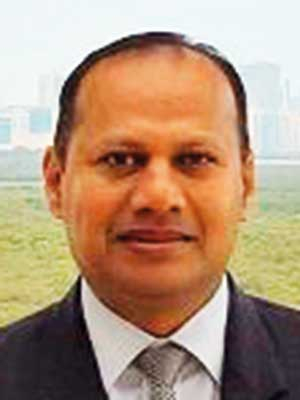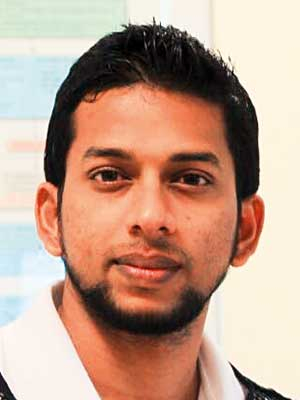
Dubai: The quick action of a medical dispatcher at the Dubai Corporation for Ambulance Services (DCAS) saved the life of a UAE resident who had a cardiac arrest during iftar time. The paramedic’s humane response was greatly appreciated by the victim and his family.
On June 11, Mark Aranjo, 45, a senior hospitality executive and resident of Abu Dhabi who came to visit his sister in Dubai, suffered cardiac arrest and collapsed. Narrating the incident, Gail D’Souza, his sister, told Gulf News: “My brother, who had suffered a heart attack earlier and has a stent in his artery, was playing with my niece. He was moving and dancing with her when he suddenly felt breathless and fell down. Since I knew his history, I immediately gave him an oxygen inhaler and called 999. It was 7.42pm, and we were anxious since it was iftar time and thought the ambulance would be delayed,” said D’Souza.
Her husband made a call which was received by Shafeeq Koleth, a DCAS paramedic, who dispatched an ambulance immediately and it arrived at D’Souza’s house in five minutes. While the ambulance was headed for the house, Koleth asked D’Souza’s husband to describe the symptoms of her bother’s condition. “He gave us instructions on the phone to perform cardio pulmonary resuscitation (CPR),” said D’Souza. “He did the counting and instructed us step by step on the CPR procedure which played an important role in reviving my brother who was showing no movement. The CPR maintained a supply of oxygen to the brain and the efficient team of DCAS took Mark to Rashid Hospital emergency section. I am so thankful to the quick thinking of the paramedic. He made the difference between life and death,” said D’Souza.
Aranjo, who underwent an emergency angiography at Rashid Hospital and was later transferred to Shaikh Khalifa Medical City (SKMC) for another heart surgery, has recovered since and is convalescing at his Abu Dhabi home. He told Gulf News: “I have no memory of what happened as I had lost consciousness. But am eternally grateful to the services of Koleth. Had he not given the precise life-saving instructions, I would not be here today. When I have recovered, I will meet Koleth and personally thank him for saving my life.”
Koleth, 30, who works as a medical dispatcher for DCAS, told Gulf News: “I recall on June 11, I had just ended my fast and was finishing my iftar when I got this call and the caller was very nervous. I realised his close relative had collapsed and the first thing I needed to do was to calm him and establish what were the symptoms. From what he described, I concluded that the patient was suffering a cardiac arrest. Luckily, the person who called was using two phone numbers. On the first phone which was on speaker mode, I gave him exact instructions to conduct CPR while on the second phone, another family member was coordinating with the ambulance driver and paramedics for correct location. I continued telling him to push very hard and also told him if he was tired, his wife should take over and administer CPR. In the meanwhile, I had dispatched two ambulances, one with a specialist doctor for cardiac cases. By the time the ambulance arrived, the patient’s relatives reported some lip movement in the patient,” said Koleth.
Explaining the role of CPR, Koleth said, “When the chest collapses, administering CPR increases the chance of reviving a patient as it allows oxygen supply to the brain to continue. In effect, it was a tremendous team work from all other paramedics and specialist doctors who arrived at the house in under five minutes and were able to reach the patient to Rashid Hospital in the nick of time.”













